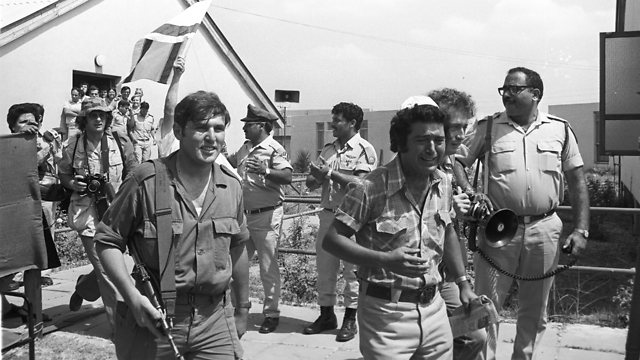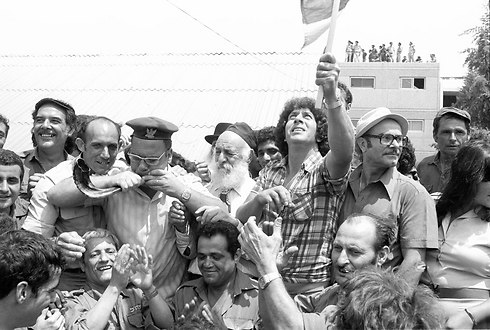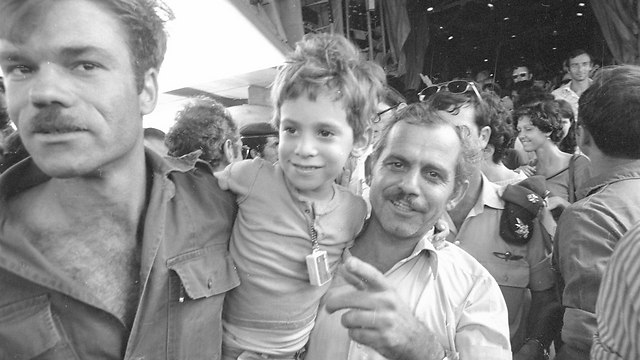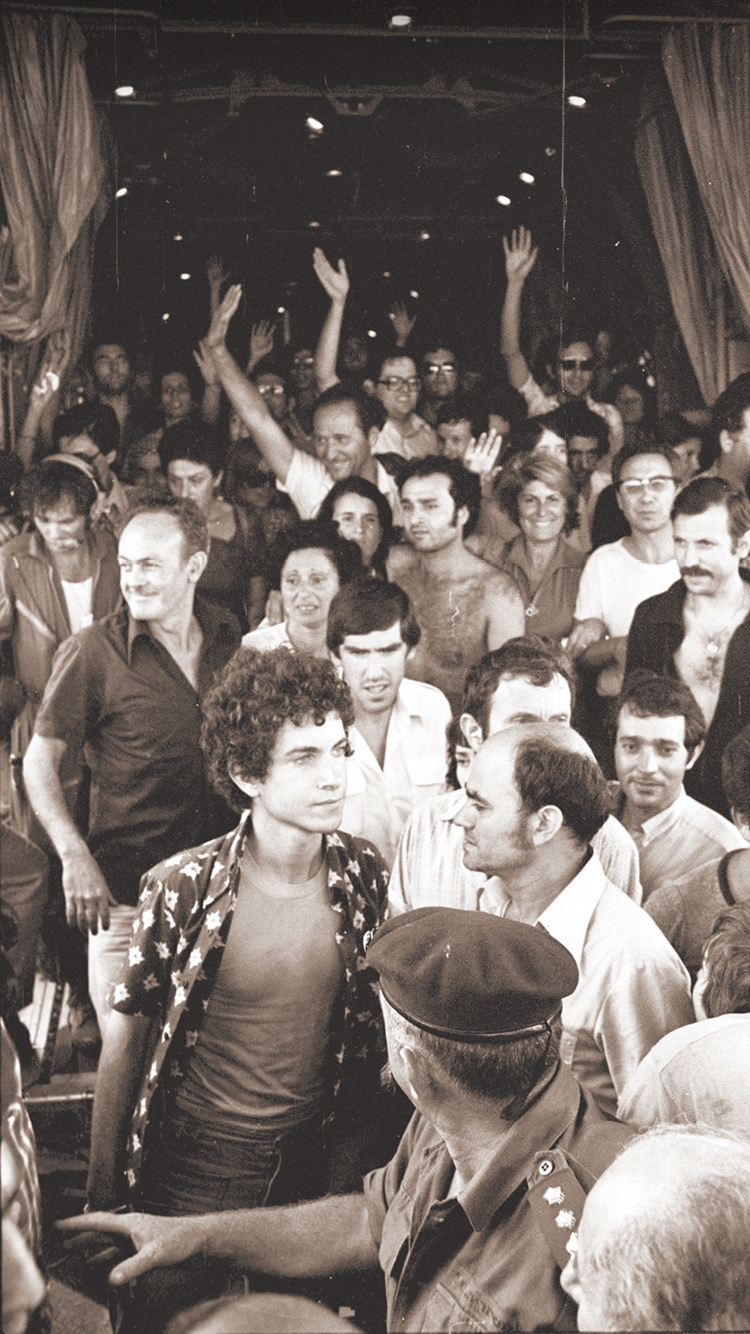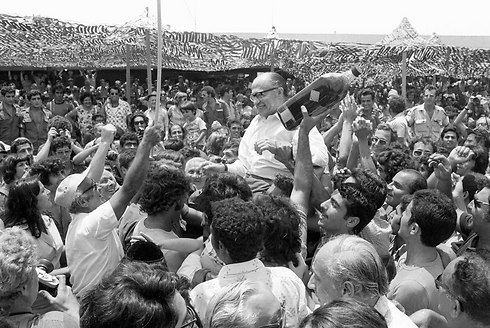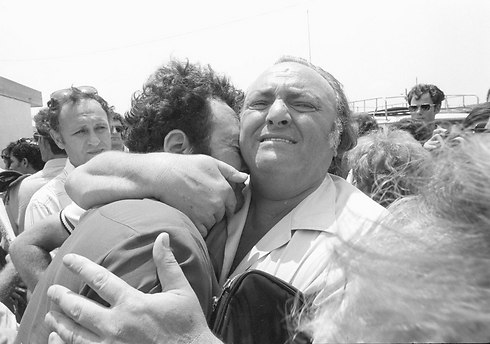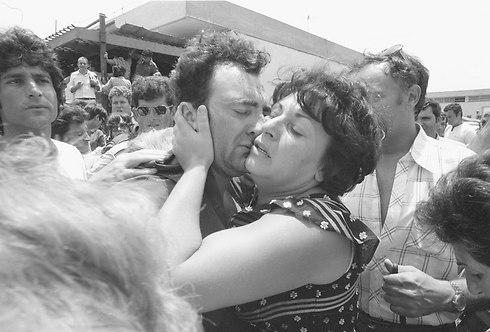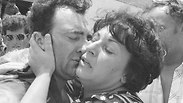
Operation Entebbe as told by the commandos: The return home
40 years after one the most famous commando operations in history, Sayeret Matkal's soldiers recount the events that culminated in the release of 106 hostages from an airport terminal in Uganda: The stressful flight home, a hero's welcome, and the joy that was mixed with pain. Part 5 of 5.
"Like every soldier at the end of a battle, you check in with yourself, make sure everything is okay. You're slowly beginning to realize you just got to be part of an extraordinary operation, and now you were on your way home," Zussman adds.
Amnon Peled, a captain in command of another raid team, remembers, "Soon after takeoff, with the noise of the plane in the background, sitting on the hood of the Land Rover, the real debriefing began. It was the first—and in reality the only—debriefing done for the raid on the terminal. Muki (Betzer, the deputy commander of Sayeret Matkal who led one of the forces charging the terminal —ed.) came up to me, and we tried to piece together what had happened. The debriefing included the team leaders, and every now and again we'd ask one of the soldiers to come over and give us his version of events.
"Muki claimed my force went in through the entrance he was supposed to use (the entrance to the passengers' hall, where the hostages were being held —RB, LBA) and that this had confused the troops. But that wasn't true, and after questioning the soldier,s it turned out that he was the one who got confused, and not us. When we asked where he was and why he arrived late and didn't charge in—since his task was to lead the forces—he said his weapon had jammed and that by the time he had unjammed it, the door was locked. I wasn't satisfied with his answers and believed the issue would become clear in the in-depth investigation of the operation that the unit was going to conduct. But without Yoni (Netanyahu, the commander of Sayeret Matkal who was killed in the operation —RB), there was no real investigation into the operation."
Muki Betzer, for his part, claimed that he stopped for a moment to change his magazine and that the entrance he was supposed to use did not exist.
The disagreement on this matter, like on a series of other issues revolving the preparations for the operation and what happened on the ground in Entebbe, has become a bone of contention within the elite unit and has later into a bitter rivalry between Betzer and the Netanyahu family, one of whose sons, Benjamin Netanyahu, is the current prime minister of Israel. This dispute also pervades in the political battles being waged these days between the prime minister and his detractors.
But in real time, the contention among the commanders was quickly pushed aside by the commandos’ jubilation.
Adam Coleman, one of the commandos, remembers, "We were all in a kind of frenzy: This feeling that 'Wow, we've done it,' of infinite victory, of 'Look, it worked.' No one was even thinking it could have gone any other way. It was crowded—very crowded—but we didn't care. We were sitting together in the belly of the plane, on both sides, with the vehicles in the middle. There wasn't a lot of space to move.
"There was an endless commotion of chatter, with everyone talking to each other and people talking in groups. We each recounted what we had done and seen, what had happened, how it had happened. One story began, and before it had ended, another one had started, another experience. What a release! Such intensity! So much noise and commotion inside the warm, loud belly of the Hercules. And there might have been a covered body on a gurney there..."
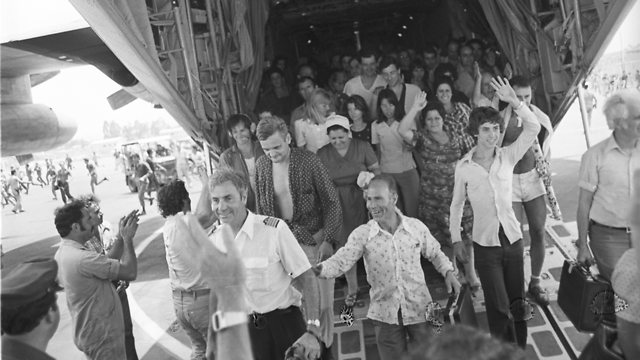
After a short flight, the Hercules planes made a stopover in Kenya to refuel. "When we took off from Entebbe, it turned out we didn't know where we were flying. We also didn't know the planes had not refueled at the Entebbe airport," Peled remembers.
"Within 40 minutes, perhaps a bit longer, we landed again. I looked around and saw a group of black men surrounding the plane, aiming their weapons at us. For several terrifying minutes, we had no idea what was going on. And then Shai Avital and Michael Aharonson—both friends from the unit who were in Kenya training the presidential guard—came on board. They told us everything was okay, that we had landed in Kenya, that we were going to refuel, evacuate the injured to hospitals in Nairobi, and then take off again, and that the Kenyans surrounding us with weapons drawn were protecting us."
Udi Shalvi, at the time a captain in command of two of the armored vehicles, remembers, "Suddenly, Ehud Barak showed up, patted our shoulders and said 'We need to finish refueling without delay and then leave Kenya as fast as possible, because the Kenyans just found out we had already released the hostages, rather than still preparing to head out there, like I told them.' The aircrew accelerated the fueling—after a problem arose that delayed us by almost half an hour—and we immediately got on board the plane and took off around 3am."
During that stop in Kenya, many of the commandos heard of the death of Sayeret Matkal's commander, Lt. Col. Yonatan "Yoni" Netanyahu, for the first time.
Tamir Pardo, the former Mossad chief who at the time was Netanyahu's radio operation, describes his reaction to the news. "The leopard uniforms (of the Ugandan army, worn by the commandos to deceive the enemy —ed.) were stained with blood... different thoughts were going through my mind. I was a meter away from Yoni. How could he have been hit? And why him? I don't remember feeling uplifted by the successful execution (of the operation). I felt like a balloon that had the air taken out of it."
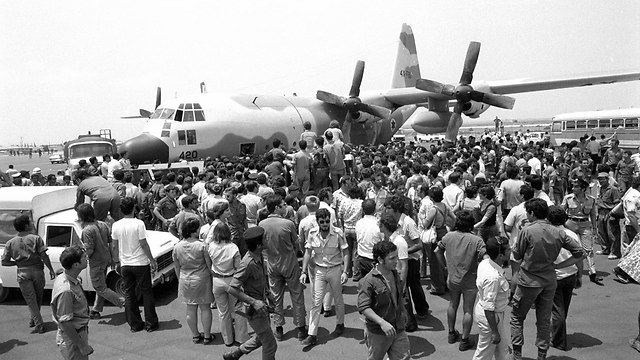
"Suddenly, the entire operation seemed different," recounts Alon Shemi, a young captain who headed an armored vehicle. "A deep sadness came over me; the euphoria and the great burst of jubilation from our success dimmed. I had a complicated relationship with Yoni, but while planning the operation, we were working very closely, and perhaps because of that, the blow of his death struck me so hard, and from that moment on, it put everything in a different light."
Coleman remembers, "It was a very strange situation: We were very happy, very proud, and the mood on the plane was of excitement and laughter, and all of a sudden Yoni was dead. And surprisingly, the news of his death didn't really put an end to the excitement. Our adrenaline was high, and it took us a while to calm down. It was only much later that we really internalized that Yoni had died. And then we took off from Kenya back to Israel. (Everyone aboard) the plane started dozing off; the adrenaline was dying down, and sadness took hold."
Eyal Yardenai, a staff sergeant in Rami Sherman's holding force, recounts, "At the time, I hadn't known the Ugandan Air Force was destroyed by our forces, and from the stories about Idi Amin (the Ugandan despot —ed.), I thought the shame of it wouldn't let him rest and he would surely send planes to shoot us down. That thought, and the fear the plane could be blown up at any given moment, stayed with me throughout the flight back."
Shalvi tells, "Around 5am, when the dawn broke, we received a message on the comms that a French or English radio station had reported on the operation, saying the Israeli planes were on their way back. There was a lot of stress in the cockpit at that moment, because the distance from home was still very great, and on both sides of our flight path were hostile countries—Sudan and Egypt to our west, and Saudi Arabia to our east—that could easily send fighter jets to shoot us down. The pilots had no choice but to decide to fly over the Red Sea at a very low altitude, so the planes would not appear on the radars of enemy states.
"As time went by, the tensions in the cockpit increased, and everyone sitting there was straining their eyes, looking to the sides and straight ahead in an effort to spot enemy planes, should any appear. Suddenly, the captain said, 'Fighter jets ahead...' My heart skipped a beat, but within seconds we heard the voices of Israeli fighter pilots on the comms, who congratulated us on the operation, and (told us) that they were there to ensure no enemy plane hit us.
"And, indeed, the black spots we saw far ahead became, within seconds, a couple of Phantoms with the Star of David (painted on them), and they flew on each side of the Hercules. We were all choked up over this display of Israeli strength, and because the threat of being shot down had been lifted.
"The flight continued for quite a while longer, but by then we could already see the coast of the Sinai Peninsula on the horizon. After flying over Eilat, Oz, the captain, was told on the comms that he needed to land in Tel Nof (Air Force base in central Israel —RB)."
A bittersweet return
"When we got back to Israel, we circled over Lod (where the Israel Air Force base is located, adjacent to Ben-Gurion International Airport —RB)," Rami Sherman remembers. "I was glued to the window, watching the exciting sight of masses of people surrounding the plane that was carrying the hostages, which had already landed. We kept flying to Tel Nof base, where Prime Minister Yitzhak Rabin, Defense Minister Shimon Peres, and IDF chief Mordechai ‘Motta’ Gur were waiting for us. After a short conversation with them, we went back to the unit’s base."
Shemi recounts, "And then we landed in Tel Nof, after already hearing the news about the waves of jubilation spreading across the country. We took a bus to the unit’s base, passed by Ben Gurion Airport, and saw the celebration around the plane that carried the hostages from afar. In every junction or town, we saw signs of truly ecstatic joy... I was sitting there, seeing these displays, feeling proud but also angry, really angry, at this hysteria... both because we were coming back with our dead commander, and because I knew that these bipolar people would have reacted the exact opposite way if, heaven forbid, we had failed, or partially failed. After all, it was just the day before that there were still protests outside the Prime Minister's Office of relatives of the hostages who were demanding a hostage exchange deal. My reaction was so strong that it clouded everything else."
Amir Ofer, the first commando to storm the passengers' hall, remembers, "I was completely exhausted. The last two nights without sleep, the vomiting, the pills I took on the way over, the stress before the operation, and above all the series of hair-raising experiences I had at the terminal itself—coming one after the other—and the fact I survived them by the skin of my teeth—had drained me of what energy I had left.
"When the back ramp opened, I saw the dozens of photographers standing there and decided to leave through a side door. That is why I don't have any photos from the operation. I came out of the darkness inside the plane to the scorching and blinding sun of July 4 and felt dizzy—I almost blacked out. I had to sit down on the runway and calm down. I was sitting like that for a few seconds, alone, with my eyes closed, slowly taking in the incredible experience I had just had."
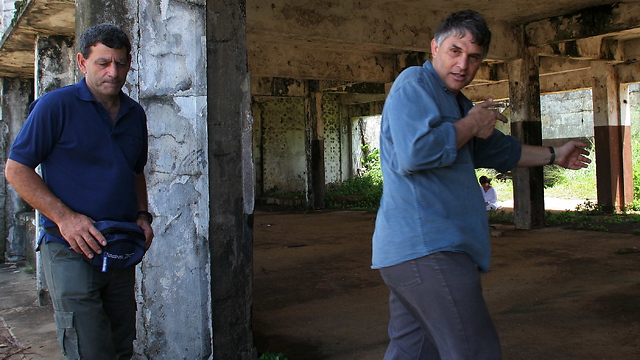
Shalvi recounts, "Dozens of soldiers welcomed us with cheers, and we were bursting with pride, but we also realized there was no time for celebrations. We had to get on the armored vehicles and quickly drive to the unit’s base. There, I met Orly, my girlfriend at the time and my wife today. We embraced for a long time, and she, in tears, told me that during the night, while she and three other girls from the unit were at the switchboard, Brurya, Yoni's girlfriend, called several times to ask what was going on. In the last of these calls, Orly promised Brurya she would update her as soon as any information came in. The information was indeed received a while later, but it was still incomplete. The message said the planes were on their way home, and that all of the soldiers were safe and sound... Orly told me that—as she promised she would do—she called Brurya immediately, gave her the update, and recommended that she got some sleep. Less than half an hour later, the girls received the news Yoni had died. Orly felt terrible..."
After an initial debriefing at Sayeret Matkal's dining room, Pardo was given an incredibly difficult task. "The evening came and Amiram (Levin, who was appointed the commander of unit after Netanyahu's death —ed.) asked me to go to Jerusalem and tell Iddo, Yoni's brother, what had happened," he remembers.
Dr. Arieh Shalev, who would later go on to become the head of psychiatry at the Hadassah Medical Center and at the time was a combat doctor in Bar-Lev's force, remembers, "When we returned home, I thought it appropriate for David Hassin (the doctor who treated Netanyahu in the field — RB, LBA) to go see Yoni's body. This is what I did when Itamar (Ben-David, another Sayeret Matkal commando — RB, LBA) was killed in the Savoy Hotel terror attack: It spares you from a life of doubts and the feeling that you could've saved your patient and failed. But I couldn't convince him to go.
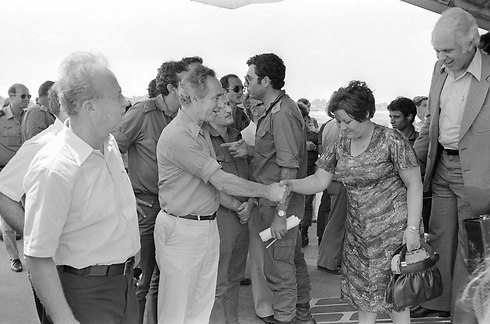
“Ehud Barak arrived at the unit's base, and together we examined Yoni's webbing (load-bearing straps). There was a mini-grenade in his breast-pocket with a bullet lodged inside that appeared to have been fired from above. I thought at the time that it meant Yoni was hit from the gunfire from the control tower, but all of this was in hindsight and didn't matter much.
"Two days after we returned home, I got a phone call from a friend who told me about a teenager from among the hostages who was having a hard time dealing with what had happened. He wasn't sleeping at night, and was experiencing a lot of distress. I asked to see him, and he told me how, during the raid, he was lying behind a wall that hid him, but he could hear intense gunfire and see the bullets hit the floor and the wall opposite him. While they were in captivity, he had also befriended Jean-Jacques Mimouni, who was killed in the raid. The hardest memory, he said, was of passively lying there, paralyzed, seeing the bullets hit the wall and knowing he could soon be discovered and killed.
"I thought he deserved a corrective emotional experience, so I took him, along with the Kalashnikov I was always carrying, to the shooting range near the unit's base. Such a young guy, I didn't know how he would react to the shooting, so I held him and started shooting single rounds and short bursts. He immediately identified the noise, and particularly the smell. I told him to try to shoot himself, while I kept holding him, and added, 'You're in control now; you're no longer a victim to gunfire.' He started with single rounds, and shortly after fired bursts. One magazine after another. With rage and excitement. If I had had enough magazines, it's quite possible we'd still be shooting there with a crazy, liberating joy. He got his closure. I heard he was doing better after, and for many years later. Who would have believed it? A Kalashnikov as a therapeutic instrument. I'm not sure if this will become a recommended psychiatric practice, but it was effective."
Danny Arditi, who went on to become the national security adviser and at the time was a captain in command of one of the raid teams, recounts, "Now, looking back, I think we were naïve, and we didn't really understand what a significant event the operation was. After the operation, most of the unit's soldiers, myself included, moved on and immediately returned to anonymity and to our daily lives. We were just not interested with everything that was happening around us (in the operation —ed.). We were immediately sucked into another operation, and afterwards hardly ever spoke of what happened."
Dr. Ronen Bergman is Yedioth Ahronoth's chief military and intelligence correspondent. Follow him on Twitter @ronenbergman
Lior Ben-Ami is the head of Yedioth Ahronoth's investigative team. Contact him at [email protected]










